- Open Source CEO by Bill Kerr
- Posts
- Helping Companies Becoming AI-First
Helping Companies Becoming AI-First
An interview with Mark Laurence, Founder at Ten Past Tomorrow. 🧶
👋 Howdy to the 1,340 new legends who joined this week! You are now part of a 194,582 strong tribe outperforming the competition together.
LATEST POSTS 📚
If you’re new, not yet a subscriber, or just plain missed it, here are some of our recent editions.
🚀 Figure: Displacing Trust With Truth. How one company is building the everything exchange.
🗝️ AI-Ready Growth Strategies For 2025. Seven levers to future-proof your growth today.
🦸♂️ From 150k Waitlist To $30 Million Series A. How Superpower cracked the code on accessible healthcare.

PARTNERS 💫
Brought to you by Attio—the AI-native CRM.
Connect your email, and you’ll instantly get a CRM with enriched customer insights and a platform that grows with your business.
With AI at the core, Attio lets you:
Prospect and route leads with research agents
Get real-time insights during customer calls
Build powerful automations for your complex workflows
Join industry leaders like Granola, Taskrabbit, Flatfile and more.
Interested in sponsoring these emails? See our partnership options here.

HOUSEKEEPING 📨
Enjoyed myself at my first Argentine wedding last weekend. It was a big moment for me, actually, as I’ve actually missed 3-4 of the last weddings I’ve planned due to some (more than) pesky anxiety I suffer (anyone else get this?).
It was to put on a nice suit, ever so slightly trim the beard, and head out for the evening. I must say, I thought Australians like to let their hair down at a wedding. The Latin weddings, though, are something else entirely. | 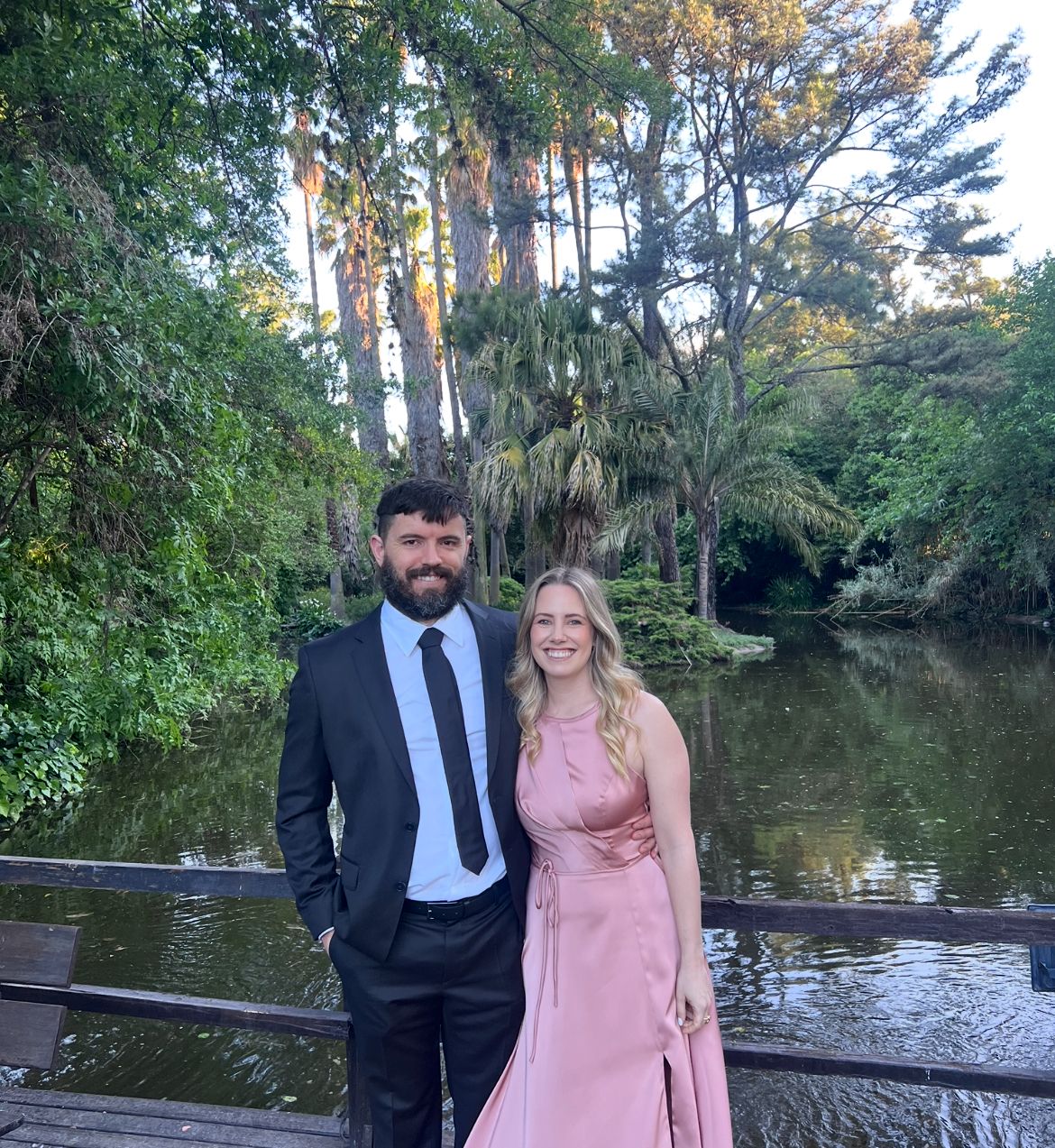 |
We are a pretty technology-forward organization, but it gave us strong frameworks for rolling out our AI strategy across the entire organization. Anyway, I hope you enjoy it!

INTERVIEW 🎙️
Mark Laurence, Founder at Ten Past Tomorrow
Mark Laurence founded Ten Past Tomorrow, a boutique consultancy that helps business leaders conceive and execute AI-first transformation and leadership strategy. Mark guides leadership teams in building organization-wide AI literacy, governance, and culture, focusing on strategic planning, leadership training, and cohort-based learning through his signature course, Rapid AI Traction for Senior Leadership Teams.
Mark’s approach is grounded in fluency-led change rather than just tools. He emphasizes that AI adoption begins with AI-fluent leadership, not software. By aligning leadership teams around AI strategy, training, policy, and internal AI councils, he helps embed AI into company DNA. His consulting has accelerated productivity and meaningful change for New Zealand firms and global clients alike. In addition to consulting, Mark is an active speaker and thought leader on AI ethics, human-centered AI strategy, and the future of work. He regularly publishes articles on AI vision, operations, ethics, and leadership transformation through the Ten Past Tomorrow platform.

What mindset does an organization need around AI in 2025?
An AI-reflexive mindset happens when people and organizations turn to AI as a first instinct, at the right times (and just as importantly, when they’re skilled at deciding when AI is not the answer). Being AI-reflexive is when it becomes second nature for all employees to use AI to augment and extend their human skills, intelligence, experience and wisdom. It’s the state when everyone in the company knows how to use AI tools, are comfortable with the technology and skilled at applying it. This creates radical efficiency and productivity gains across the board.
But here's the thing about it… it's not just about having the right AI tools. The real magic happens when AI becomes part of your company culture and your leadership champions it. When teams are celebrated for their wins—and failures—with AI, and everyone sees it as normal, not scary. When you reach a point where everyone in the company is AI-reflexive, you're not just buying AI tools for your people and hoping for the best. You're building AI into how your organization thinks and operates.
How do you ensure buy in at every level of a company?
I’m firm on the fact that AI literacy starts at the top. Your senior leadership team needs to know AI inside and out. They need the skills themselves, not just the buzzwords. It’s imperative that the entire leadership team has tangibly experienced what it feels like to suddenly do a task in 45 mins that used to take 7 hours. And they simply won't have that hands-on, tangible experience unless they are trained and guided. AI skill and literacy doesn’t happen by accident or self-exploration.

Source: Stanford.
Here's what's fascinating for most senior leaders to learn though… becoming skillful with AI tools is actually the easy part. Give people the right AI tools and techniques, and they'll drive huge efficiency gains, very quickly. I see that every day. The hard part is getting leadership buy-in. If you start AI skills training from the bottom without support from AI-fluent leadership teams, you'll hit a wall fast. The change won't stick because a divide quickly grows between an AI-infused workforce and a leadership layer that are unprepared to guide the necessary leadership and cultural change that AI asks of them. So the smart approach is to begin with high-quality AI training programs. And to tailor them to each team and role. Don't just teach people which buttons to press. Teach them how AI works and how to use it responsibly. These programs are rare right now, but they exist.
Leadership's job goes beyond buying AI subscriptions for your people. There’s a need to build a culture where AI becomes normal. Among other things, this involves setting clear targets for AI usage, including it in performance reviews, making it part of hiring decisions, weaving it into daily workflows, etc. Cultural orientation starts by sending a clear message: ‘AI is changing how we work. We will give you all of the tools and the training to evolve with this technology, so get on board.’ | 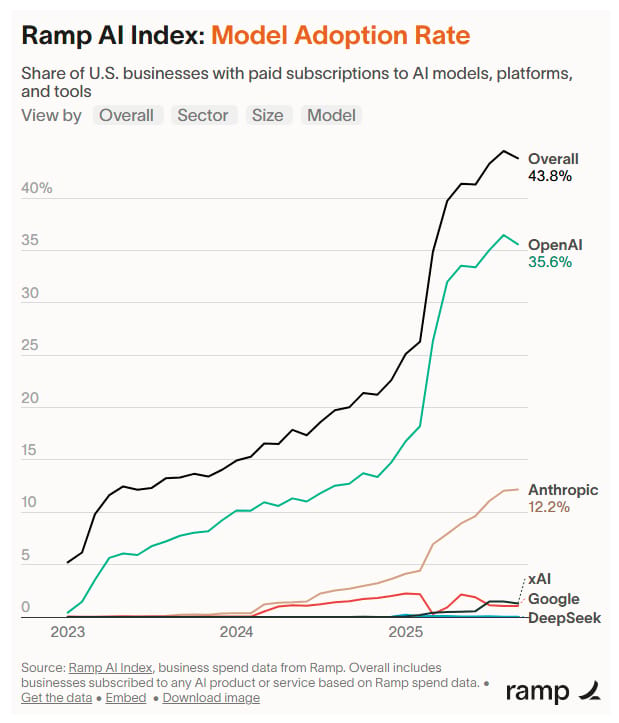 Source: Ramp. |
I acknowledge that this puts real pressure on leadership teams. AI arrived fast, and none of us asked for it. The tech companies decided we needed it. Regardless though, it is here, it’s not going away. Quite the opposite. It's accelerating at a pace that we've never seen any previous technology accelerate at. Leaders must now learn both the mindset and the technical skills to lead this transformation. They really have no choice in the matter anymore.
Do you have frameworks to overcome employee fear or resistance?
Yes, and after what I’ve said already it won’t surprise you to hear that they start with AI literacy and practical AI skills training. We begin these at senior leadership level, then roll these programs out across every level of an organization. And the programs begin with foundational training that works for everyone. Then they evolve as the technology and people's skills develop. We then make the training increasingly specific. Department by department. Team by team. Everyone needs to see their personal pathway forward with AI. But training alone won't cut it.
People need cultural signals from senior leadership. People must see their leaders actively using AI tools skillfully, ethically, and responsibly. That visible demonstration beats any policy document. Of course those documents matter, but they're just one piece of the bigger cultural shift towards AI. Companies also need to then give clear public statements from their CEOs. Unequivocally, they need to say that the future of their businesses are rooted in people + AI, and that they're supporting all employees to adapt. And here's what we see happening if you don't do this stuff…
You'll have ‘shadow AI’ usage. Employees will subscribe to their own AI tools. They'll use sensitive company data without oversight. You'll see shadow systems emerge around AI. Unofficial workflows will be built around AI, that leadership knows nothing about. What I'm saying is that this technology is being adopted whether leadership addresses and supports it or not. My strong recommendation is to get ahead of it. To create a culture that supports experimentation. We help organizations get to the point where operationally, strategically and culturally they openly celebrate AI engagement.
What are the steps for an organization beginning its AI journey?
I typically lay out a 24-month roadmap toward what I call ‘AI Emergence, ’a term I’ve lifted from Paul Roetzer, the brilliant AI commentator. This is the process through which AI becomes an embedded part of how an established organization re-wires its operations and strategy around AI. There are five strategic building blocks in that roadmap. The first three usually take 12 to 18 months, and they are:
Stage 1 | Deploy world-class AI literacy and skills training programs. For every single person in your org, from the fresh-faced new intern through to your CEO. |
|---|---|
Stage 2 | Establish internal AI councils to promote a culture of AI-first thinking, from the inside out and bottom up. |
Stage 3 | Deploy (or more often, redeploy improved versions of) AI usage policies and AI principle documents. |
Most already have some form of AI usage policy, but in many cases, these were created early on by exec teams that weren’t AI-literate or skilled themselves. As a result, those policies are more often restrictive and intimidating, rather than enabling. My recommendation is to revisit these documents once their senior leadership has gone through proper AI training.
When rewritten by leaders who understand the technology, the policies shift from limiting to empowering and they become genuine enablers of transformation. Together, these three foundational steps form the backbone of an organization’s first 12-18 months of serious AI adoption.
Who should lead the pivot towards AI?
It’s been my experience that every organization has AI champions hiding just below the surface. Very often these people haven't identified themselves yet, but they're curious about AI. They're upskilling in their personal time. They’re staying current with developments. These are the people you want on your AI council. And it’s important to acknowledge that these individuals exist at all levels. From fresh-faced interns right up to executive leadership.
An internal AI council drives momentum from the ground up and inside out. They're not responsible for regulatory stuff or usage policies. They act as forward-looking scouts. They read newsletters, listen to podcasts, and experiment with new AI tools and features. Generally, they track AI's evolution from technical, ethical, and responsible use angles. The way we set them up for clients is that they meet fortnightly, ideally over a comfortable breakfast that the company funds for them. They compare what they're seeing in the AI space and work out what it means for their organization. They also organise and facilitate AI ‘promptathons’ and various other activities that promote AI engagement and shared learning throughout teams.

Source: Allie K Miller.
Executive representation should feature in an AI council, but cannot dominate. Any senior leaders on the AI Council must make it clear they're equal participants, not superior. Everyone needs to feel they have a voice. And the council also needs a direct line to the senior decision-makers. What they observe and report must have real influence. When done well, the council brings the best AI use cases out of the shadows. They celebrate internal wins, surface challenges and share real stories of how AI is reshaping roles, processes, and workflows across the company.
Do you have AI workflow designers or engineers building AI into your operations? |


How can AI go from productivity tool to strategic thought partner?
There’s a subliminal belief, caused by the chatbot interface (which makes words appear as if they’re being written in real time). Subconsciously, that makes us think AI is just a writing or ‘doing’ tool. We see it output content so fluently and quickly that we get seduced. We think that's its core value. But senior leaders don't get paid for writing. They strategize, analyze, plan and direct. For these roles, AI is equally, if not more powerful, as a strategic collaborator as it is as a writer.
This is where great AI training programs matter. Know how to prompt well. And how to build personalized assistants in the form of things like CustomGPTs or Gems. This allows senior leaders to deploy AI on the strategic thinking, planning, and forecasting work they actually do… setting and maintaining direction for their teams and organizations. Here's what's remarkable about these tools, too... They've been trained on the world's best business thinking, frameworks, and writing. They are deeply familiar with the insights from the most influential leaders on the planet. They don't just reproduce that thinking either. They contextualize it to your own personal business challenges and opportunities.
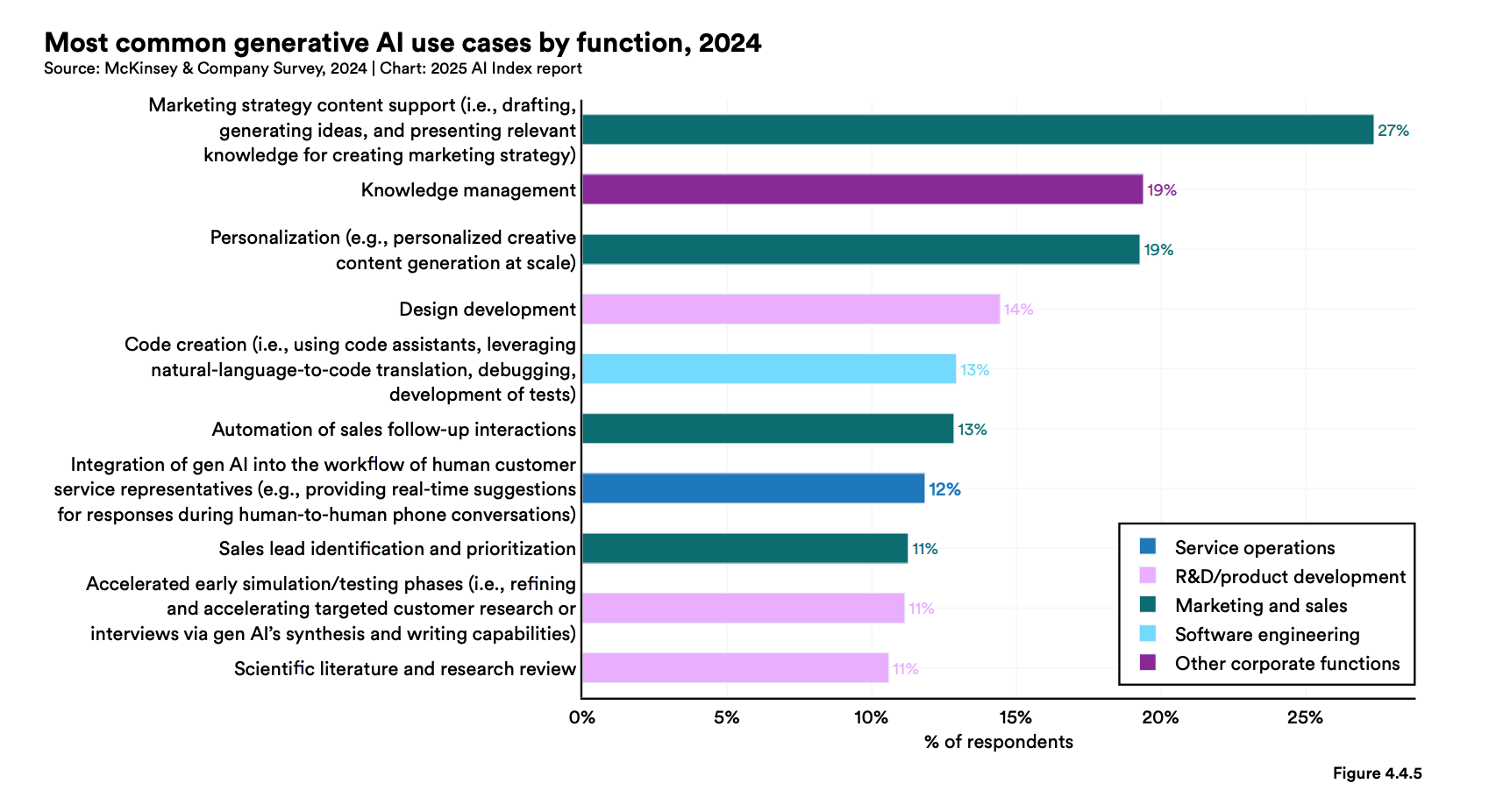
Source: Stanford.
Senior leaders have never had this privilege before. And certainly not at this level of access and affordability. The ability to work with that kind of intelligence, at scale, for around $20 a month is extraordinary! That's a key opportunity I see for senior leaders; to re-wire their mental approach to AI as something that’s not just for productivity, but for real strategic partnership.
How often do you use AI to help you think through a problem at work? |
How do you personally use AI in your day-to-day operations?
I default to a core set of AI tools daily. And it's nowhere near as many as people assume that I use. My A-team is ChatGPT, Gemini, Claude, Perplexity, NotebookLM, Wispr Flow, Midjourney, HeyGen, Napkin AI, and Veo3, as well as a few more little niche ones. I've also built around three dozen CustomGPTs that handle various tasks and processes I do regularly.
Across all these tools, I brainstorm, summarize, synthesize, strategize, create, and stress test ideas. I summarize this by saying that in weaving all my AI tools and workflows together, it feels like I have the equivalent of an extra two full-time human colleagues on my team.

Source: Mark.
Take creating a bespoke workshop or training program for a client as an example... In general, this takes me one to two days now. There's still significant manual work involved by me to make them high-quality and fit for purpose for each individual organisation. But I often think about the fact that producing the same results in the pre-generative AI era would have taken at least a week.
Some of my CustomGPTs are specifically for strategic thinking. I pre-load them with my foundational beliefs about AI, business, and transformation. I also infuse them with the best ideas from AI commentators I follow. The AI synthesizes them all together. I can then apply them to thinking scenarios when I’m making decisions about my own business or how to structure partnerships. My prompting approaches form the foundation of many training programs I deliver. So I won't divulge those secrets here, but I will share this trade secret... The best prompting frameworks just replicate the best of how we communicate with each other as humans. That’s it. They transfer those communication techniques into how we write or speak with AI. Prompting really is just communicating with an AI.
*Below is from a really nice, albeit already somewhat out-of-date piece from Peter Yang. Things are moving SO fast.

Source: Peter Yang.
People sometimes ask how AI has ‘changed’ how I run Ten Past Tomorrow. The thing is though, technically, AI hasn't changed how I run the company because it’s an AI-native business. It's been built on AI technology rather than leveraging humans to build and grow the business. Put simply, Ten Past Tomorrow could not do everything it does, at the scale it does, without AI.
💡 Note: If you are on the lookout for AI Workflow Designers, just reply to this email as my team at Athyna can help.
How do you get the best out of yourself personally and professionally?
My personal systems and habits are really quite boring. But I was taught from a young age by my parents that the fundamentals were simple. Get good sleep. Do regular exercise each day. Eat well. So I just focus on those things, and it seems to work for me. I don't actually consider running the business to be pressure-filled most of the time.
I'm lucky enough that I genuinely love what I do. I'm fascinated by the intersection of AI, people, and business. It's a real joy to run this company and see the effects it has on clients. Challenging myself and the company to push boundaries is definitely part of Ten Past Tomorrow's mission. The big goal here is to spread AI literacy, skills, and cultural transformation as deeply and widely as possible through the business community. I genuinely believe it's one of the most important things the world needs right now. They’re big goals, that are a lot of fun to chase!
And that’s it! You can follow and connect with Mark over on LinkedIn and don’t forget to check out Ten Past Tomorrow’s website.

BRAIN FOOD 🧠

TWEETS OF THE WEEK 🐣
Andreessen Horowitz website in 2010
— Kamil Ruczynski (@unable0_)
8:20 PM • Oct 22, 2025
Introducing the TBPN Media Market Map.
Understanding the evolving media landscape can be confusing, even bewildering.
From Neo Trad Media to the East Coast Underground, we put together a simple market map to help make sense of it all.
— TBPN (@tbpn)
6:59 PM • Oct 24, 2025
"Yeah let me run this by finance."
— Bill Kerr (@bill_kerrrrr)
1:00 PM • Oct 24, 2025

TOOLS WE RECOMMEND 🛠️
Every week, we highlight tools we like and those we actually use inside our business and give them an honest review. Today, we are highlighting Attio—powerful, flexible and data-driven, the exact CRM your business needs.
See the full set of tools we use inside of Athyna & Open Source CEO here.

HOW I CAN HELP 🥳
P.S. Want to work together?
Hiring global talent: If you’re hiring tech, business or ops talent and want to do it 80% less, check out my startup, Athyna. 🌏
See my tech stack: Find our suite of tools & resources for both this newsletter and Athyna here. 🧰
Reach an audience of tech leaders: Advertise with us if you want to get in front of founders, investors and leaders in tech. 👀
 |
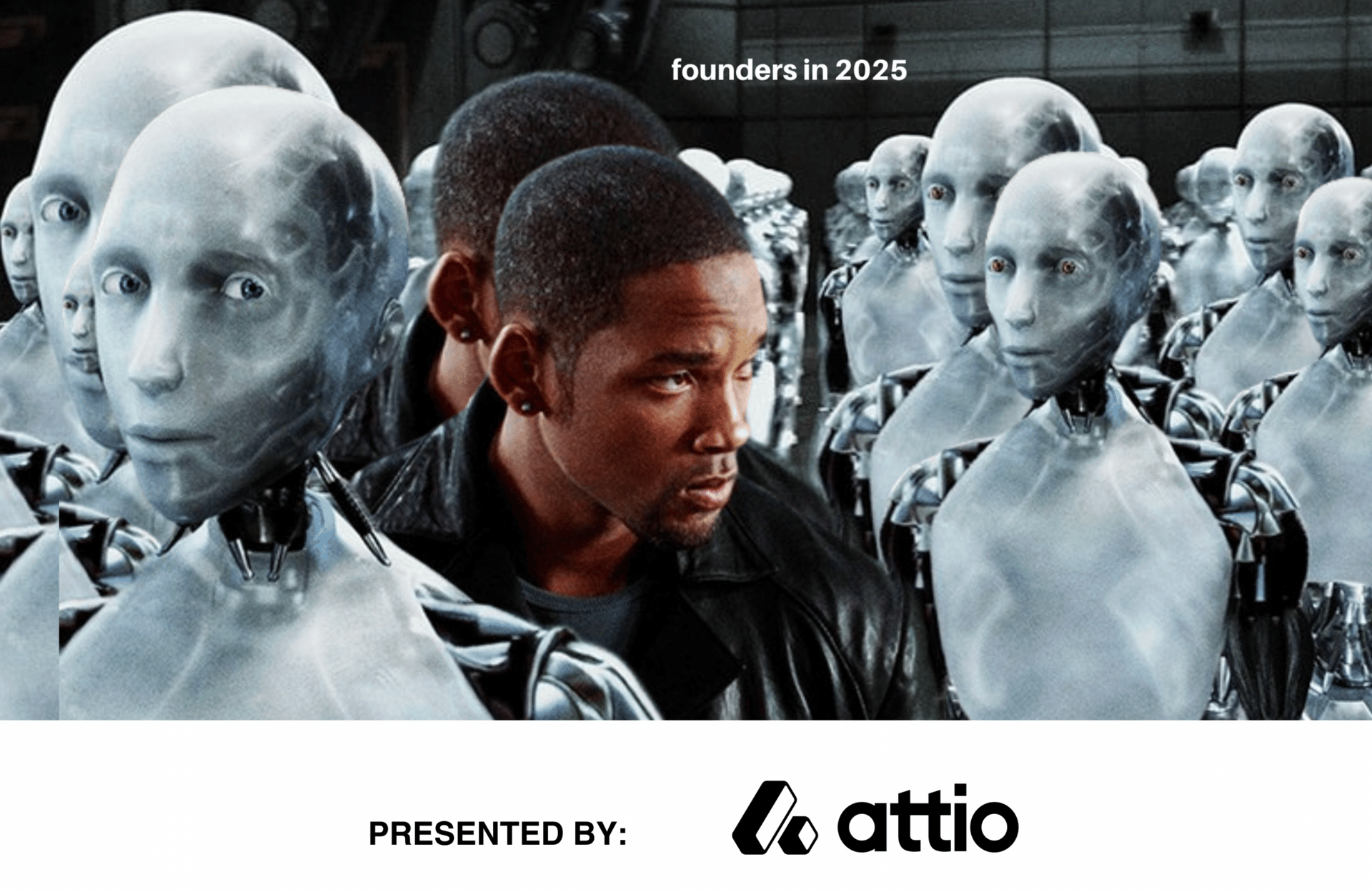
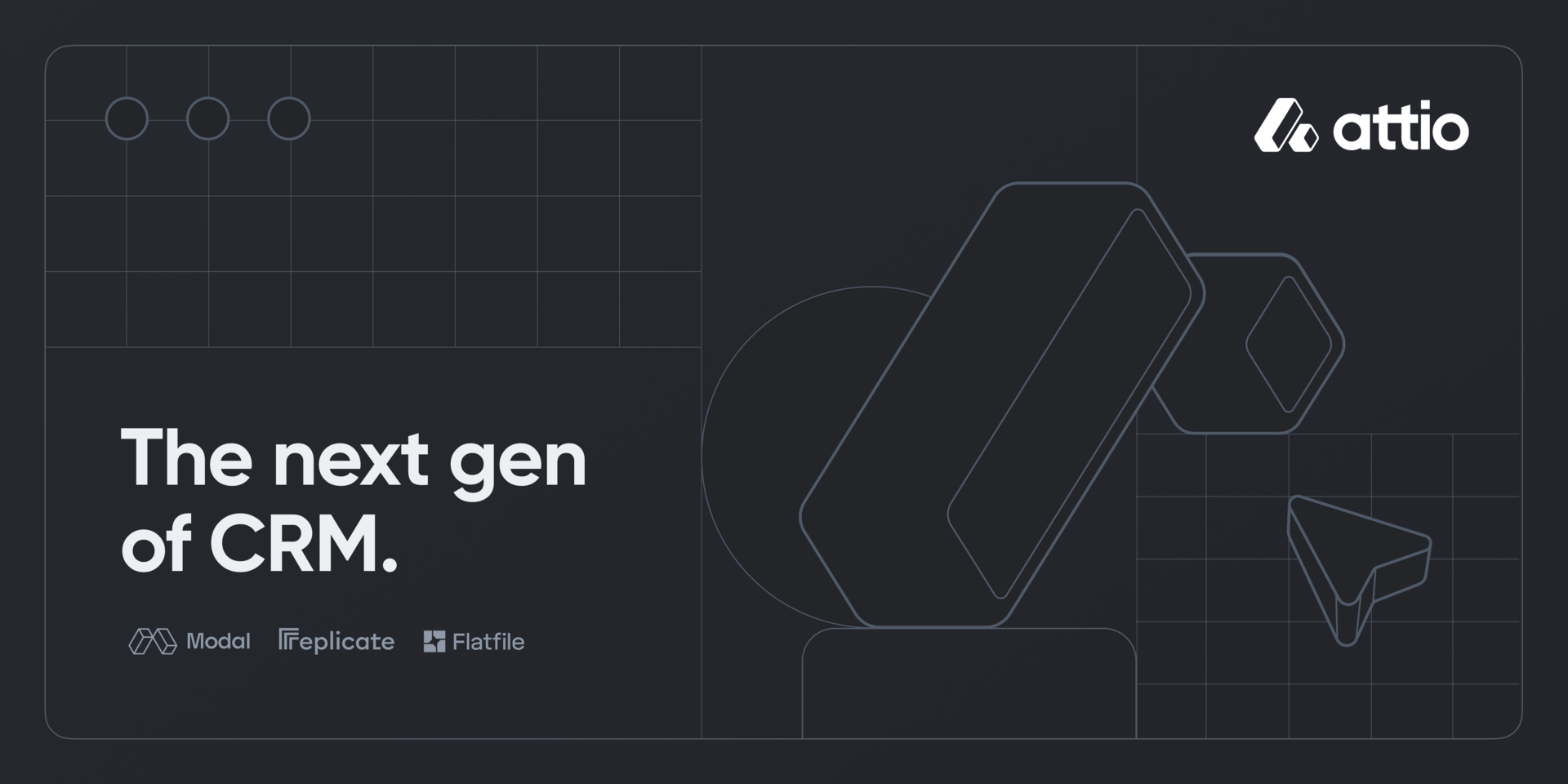

Reply